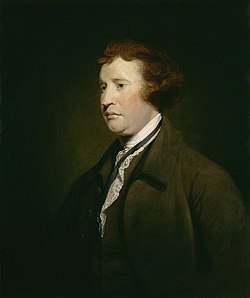Edmund Burke Quote
Certainly, Gentlemen, it ought to be the happiness and glory of a representative to live in the strictest union, the closest correspondence, and the most unreserved communication with his constituents. Their wishes ought to have great weight with him; their opinions high respect; their business unremitted attention. It is his duty to sacrifice his repose, his /pleasure, his satisfactions, to theirs/, --- and above all, ever, and in all cases, to prefer their interest to his own.But his unbiased opinion, his mature judgement, his enlightened conscience, he ought not to sacrifice to you, to any man, or to any set of men living. These he does not derive from your pleasure, --- no, nor from the law and the Constitution. They are a trust from Providence, for the abuse of which he is deeply answerable. Your Representative owes you, not his industry only, but his judgement; and he betrays, instead of serving you, if he sacrifices it to your opinions.
Certainly, Gentlemen, it ought to be the happiness and glory of a representative to live in the strictest union, the closest correspondence, and the most unreserved communication with his constituents. Their wishes ought to have great weight with him; their opinions high respect; their business unremitted attention. It is his duty to sacrifice his repose, his /pleasure, his satisfactions, to theirs/, --- and above all, ever, and in all cases, to prefer their interest to his own.But his unbiased opinion, his mature judgement, his enlightened conscience, he ought not to sacrifice to you, to any man, or to any set of men living. These he does not derive from your pleasure, --- no, nor from the law and the Constitution. They are a trust from Providence, for the abuse of which he is deeply answerable. Your Representative owes you, not his industry only, but his judgement; and he betrays, instead of serving you, if he sacrifices it to your opinions.
Related Quotes
There's a certain amount of ambiguity in my background, what with intermarriages and conversions, but under various readings of three codes which I don’t much respect (Mosaic Law, the Nuremberg Laws,...
I don't purchase people with money, or hiss like a snake to attract their attention, all i do is to rest on my couch because i have the conviction that no human can progress with an exception without...
We are souls, eternal and perfect, captains of our mystic ships: gods and goddesses of our universe. We are beautiful, we pearls of grit. We, the ember of everything. Our uniqueness IS what makes us s...
When I say 'I won't hurt you', it's a promise, which can and will be kept but it does not come from me without a breakdown of what it means.It does not mean we will never disagree, nor does it mean th...
About Edmund Burke
Burke was a proponent of underpinning virtues with manners in society and of the importance of religious institutions for the moral stability and good of the state. These views were expressed in his satirical work, A Vindication of Natural Society (1756). He also criticised the actions of the British government towards the American colonies, including its taxation policies. Burke supported the rights of the colonists to resist metropolitan authority, although he opposed the attempt to achieve independence. He is further remembered for his long-term support for Catholic emancipation, the impeachment of Warren Hastings from the East India Company, and his opposition to the French Revolution.
In his Reflections on the Revolution in France (1790), Burke asserted that the revolution was destroying the fabric of good society and traditional institutions of state and society, and he condemned the persecution of the Catholic Church that resulted from it. This led to his becoming a popular leading figure within the conservative faction of the Whig Party which he dubbed the Old Whigs as opposed to the pro-French Revolution New Whigs led by Charles James Fox.
In the 19th century, Burke was praised by both conservatives and liberals. Subsequently, in the 20th century, he became widely regarded, especially in the United States and the United Kingdom, as the philosophical founder of conservatism, along with his ultra-royalist and ultramontane counterpart Joseph de Maistre. His writings and literary publications influenced British conservative thought to a great extent, and helped establish the earliest foundations for modern conservatism and liberal democracy.
